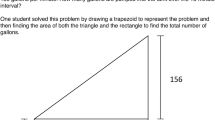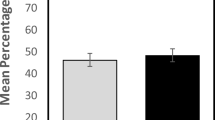Abstract
Students’ judgements of their own learning often exceed their knowledge on a given topic. One source of this pervasive overconfidence is fluency, the perceived ease with which information is acquired. Though effects of fluency on metacognitive judgments have been explored by manipulating relatively simple stimuli such as font style, few studies have explored the effects of fluency on more complex forms of learning encountered in educational settings, such as learning from lectures. The present study manipulated the fluency of a 31-min video-recorded lecture, and measured its effects on both perceived and actual learning. In the fluent condition, the instructor used non-verbal gestures, voice dynamics, mobility about the space, and appropriate pauses. In the disfluent condition, the same instructor read directly from notes, hunched over a podium, rarely made eye contact, used few non-verbal gestures, spoke in monotone pitch, and took irregular and awkward pauses. Though participants rated the fluent instructor significantly higher than the disfluent instructor on measures of teaching effectiveness and estimated that they had learned more of the material, actual learning between the two groups did not differ as assessed by a memory test over the lecture contents given immediately (Experiment 1) or after a 1-day delay (Experiment 2). This counterintuitive result reveals an “illusion of learning” due to fluency in lecture-based learning, a very common form of instruction.



Similar content being viewed by others
Notes
The lecture was created by the first author using a number of sources, and contained content relevant to the quantification, storage, and transmission of information. The topic was chosen because it was high in factual content and deemed unlikely to be highly familiar to undergraduate students taking a psychology course. References used in the construction of the lecture, the experimental script, and the multiple-choice test can be found at https://goo.gl/OxHBcs).
Test performance in both conditions was significantly higher than the performance of the 15 participants who took the test without watching the video first (see Materials section of Experiment 1). This was true for both Experiment 1 and Experiment 2, ts > 4.65, ps < .001, indicating that significant learning occurred in both the fluent and disfluent conditions.
References
Abrami, P. C., Leventhal, L., & Perry, R. P. (1982). Educational seduction. Review of Educational Research, 52, 446–464.
Alter, A. L., & Oppenheimer, D. M. (2009). Uniting the tribes of fluency to form a metacognitive nation. Personality and Social Psychology Review, 13(3), 219–235.
Carpenter, S. K., & Olson, K. M. (2012). Are pictures good for learning new vocabulary in a foreign language? Only if you think they are not. Journal of Experimental Psychology: Learning, Memory, and Cognition, 38, 92–101.
Carpenter, S. K., Wilford, M. M., Kornell, N., & Mullaney, K. M. (2013). Appearances can be deceiving: Instructor fluency increases perceptions of learning without increasing actual learning. Psychonomic Bulletin & Review, 20(6), 1350–1356.
Carpenter, S. K., Mickes, L., Rahman, S., & Fernandez, C. (2016). The effect of instructor fluency on students’ perceptions of instructors, confidence in learning, and actual learning. Journal of Experimental Psychology: Applied, 22(2), 161–172.
Dunlosky, J., & Nelson, T. O. (1994). Does the sensitivity of judgments of learning (JOLs) to the effects of various study activities depend on when JOLs occur? Journal of Memory and Language, 33, 545–565.
Dunlosky, J., & Tauber, S. K. (Eds.). (2016). The Oxford handbook of Metamemory. New York: Oxford University Press.
Finn, B., & Metcalfe, J. (2007). The role of memory for past test in the underconfidence with practice effect. Journal of Experimental Psychology: Learning, Memory, and Cognition, 33, 238–244.
Finn, B., & Tauber, S. K. (2015). When confidence is not a signal of knowing: How students’ experiences and beliefs about processing fluency can lead to miscalibrated confidence. Educational Psychology Review, 27(4), 567–586.
Foster, N. L., Was, C. A., Dunlosky, J., & Isaacson, R. M. (2017). Even after thirteen class exams, students are still overconfident: The role of memory for past exam performance in student predictions. Metacognition and Learning, 12(1), 1–19.
Hacker, D. J., Bol, L., Horgan, D. D., & Rakow, E. A. (2000). Test prediction and performance in a classroom context. Journal of Educational Psychology, 92, 160–170.
Hartwig, M. K., & Dunlosky, J. (2017). Category learning judgments in the classroom: Can students judge how well they know course topics? Contemporary Educational Psychology, 49, 80–90.
Koriat, A., & Bjork, R. A. (2005). Illusions of competence in monitoring one’s knowledge during study. Journal of Experimental Psychology: Learning, Memory, and Cognition, 31, 187–194.
Kornell, N., & Hausman, H. (2016). Do the best teachers get the best ratings? Frontiers in Psychology, 7, 570.
Magreehan, D. A., Serra, M. J., Schwartz, N. H., & Narciss, S. (2016). Further boundary conditions for the effects of perceptual disfluency on judgments of learning. Metacognition and Learning, 11, 35–56.
Miller, T. M., & Geraci, L. (2011). Unskilled but aware: Reinterpreting overconfidence in low-performing students. Journal of Experimental Psychology: Learning, Memory, and Cognition, 37(2), 502–506.
Mueller, M. L., Tauber, S. K., & Dunlosky, J. (2013). Contributions of beliefs and processing fluency to the effect of relatedness judgments of learning. Psychonomic Bulletin & Review, 20, 378–384.
Mueller, M. L., Dunlosky, J., Tauber, S. K., & Rhodes, M. G. (2014). The font-size effect on judgments of learning: Does it exemplify fluency effects or reflect people’s beliefs about memory? Journal of Memory and Language, 70, 1–12.
Mueller, M. L., Dunlosky, J., & Tauber, S. K. (2016). The effect of identical word pairs on people’s metamemory judgments: What are the contributions of processing fluency and beliefs about memory? Quarterly Journal of Experimental Psychology, 69, 781–799.
Neath, I. (1996). How to improve your teaching evaluations without improving your teaching. Psychological Reports, 78, 1363–1372.
Paik, E. S., & Schraw, G. (2012). Learning with animation and illusions of understanding. Journal of Educational Psychology, 105(2), 278–289.
Perry, R. P., Abrami, P. C., & Leventhal, L. (1979). Educational seduction: The effect of instructor expressiveness and lecture content on student ratings and achievement. Journal of Educational Psychology, 71, 107–116.
Reber, R., & Greifeneder, R. (2017). Processing fluency in education: How metacognitive feelings shape learning, belief formation, and affect. Educational Psychologist, 52(2), 84-103.
Rhodes, M. G., & Castel, A. D. (2008). Memory predictions are influenced by perceptual information: Evidence for metacognitive illusions. Journal of Experimental Psychology: General, 137(4), 615–625.
Rhodes, M. G., & Castel, A. D. (2009). Metacognitive illusions for auditory information: Effects on monitoring and control. Psychonomic Bulletin & Review, 16(3), 550–554.
Sanchez, C. A., & Khan, S. (2016). Instructor accents in online education and their effect on learning and attitudes. Journal of Computer Assisted Learning, 32, 494–502.
Serra, M. J., & Dunlosky, J. (2010). Metacomprehension judgements reflect the belief that diagrams improve learning from text. Memory, 18(7), 698–711.
Serra, M. J., & Magreehan, D. A. (2016). Instructor fluency correlates with students’ ratings of their learning and their instructor in an actual course. Creative Education, 7(8), 1154–1165.
Spooren, P., Brockx, B., & Mortelmans, D. (2013). On the validity of student evaluation of teaching: The state of the art. Review of Educational Research, 10, 1–45.
Ware Jr., J. E., & Williams, R. G. (1975). The Dr. Fox effect: a study of lecturer effectiveness and ratings of instruction. Journal of Medical Education, 50, 149–156.
Williams, W. M., & Ceci, S. J. (1997). “How'm I doing?” problems with student ratings of instructors and courses. Change: The Magazine of Higher Learning, 29(5), 12–23.
Williams, R. G., & Ware, J. E., Jr. (1976). Validity of students’ ratings of instruction under different incentive conditions: A further study of the Dr. Fox effect. Journal of Educational Psychology, 68, 48–56.
Williams, R. G., & Ware Jr., J. E. (1977). An extended visit with Dr. fox: Validity of student satisfaction with instruction ratings after repeated exposures to a lecture. American Educational Research Journal, 14, 449–457.
Yue, C. L., Castel, A. D., & Bjork, R. A. (2013). When disfluency is—and is not—a desirable difficulty: The influence of typeface clarity on metacognitive judgments and memory. Memory & Cognition, 41(2), 229–241.
Author information
Authors and Affiliations
Corresponding author
Ethics declarations
Conflict of interest
The authors declare that they have no conflict of interest.
Additional information
This material is based upon work supported by the James S. McDonnell Foundation twenty-first Century Science Initiative in Understanding Human Cognition, Collaborative Grant No. 220020483.
Rights and permissions
About this article
Cite this article
Toftness, A.R., Carpenter, S.K., Geller, J. et al. Instructor fluency leads to higher confidence in learning, but not better learning. Metacognition Learning 13, 1–14 (2018). https://doi.org/10.1007/s11409-017-9175-0
Received:
Accepted:
Published:
Issue Date:
DOI: https://doi.org/10.1007/s11409-017-9175-0




